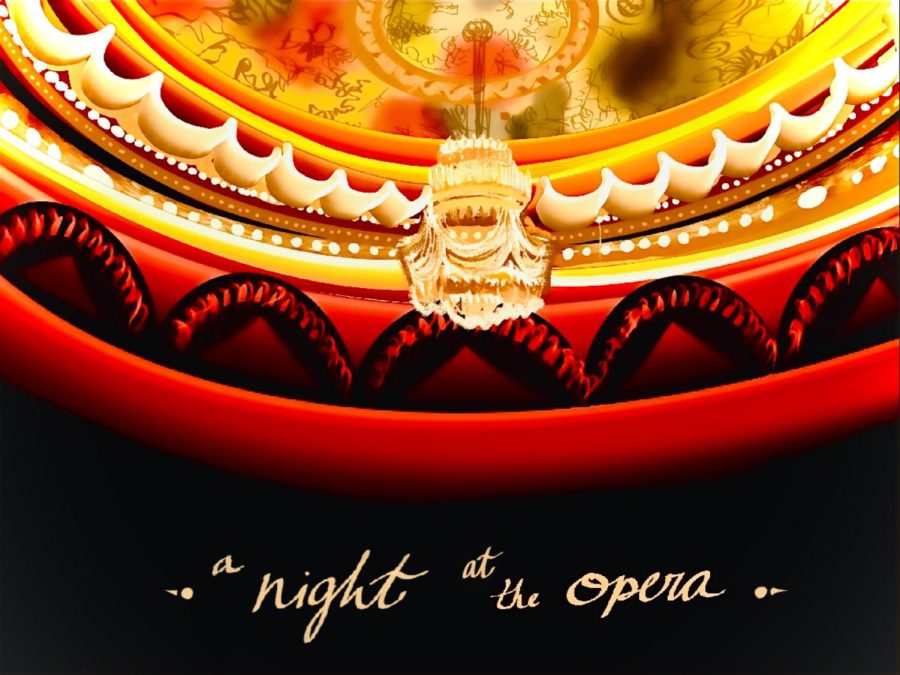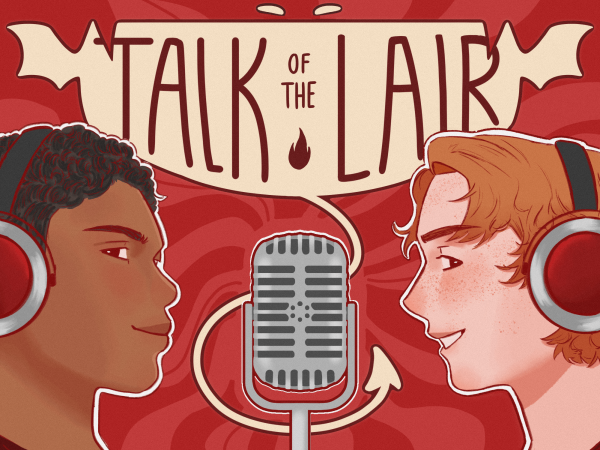Album Anatomy: “A Night at the Opera”
Follow track by track as Queen’s 1975 groundbreaking album, “A Night at the Opera” is dissected.
April 12, 2023
Released at the tail end of the year 1975, Queen’s fourth studio album, “A Night At The Opera” was pivotal within not only the rock genre, but the music industry as well. The album, presumed to be a concept album, became the band’s first to go platinum. Queen, consisting of members Brian May, Roger Taylor, John Deacon, and Freddie Mercury, carried on the tradition of the British takeover, becoming one of the most favored bands in existence. Becoming such an influential band with a stranglehold on the rock industry, Queen was able to become highly respected following the success of “A Night At The Opera”.
Following the fallout between Queen and their former manager, Norman Sheffield, the first track, “Death On Two Legs (Dedicated To…)” gave insight to the anger and betrayal felt by the band, specifically by Mercury, as he constructed the track. In an interview with Sound, he states, “The album needed a strong opening and what better way than to have the first words, ‘You suck my blood like a leech?’” Beginning with a lengthy instrumental of piano arpeggio combined with heavy electric guitars, oddly futuristic sounds and mechanical noises, the opening track to the album is pure 70s rock at its finest.
Lasting a brisk minute and eight seconds, “Lazing On A Sunday Afternoon” is one of Queen’s shortest tracks. The song revolves around finding joy in minimal life experiences and has the effect of being projected through a microphone, which was constructed by using two headphones placed within a metal can. As the microphone amplification and ragtime instrumentals give an excited feel to the song, the track contrasts greatly from the hostility of the opening track.
Inspired by a Triumph TR4, “I’m In Love With My Car” tells the relatable tale of a stereotypical macho man in love with his most prized possession. Refraining from producing the lead vocals, Mercury was on the piano while Roger, who also wrote the track, covered the vocals. “I’m In Love With My Car” is extremely passionate and explicitly created for one of the band’s roadies as the physical album states, “Dedicated to Johnathan Harris, boy racer to the end”.
Dedicated to his wife, Deacon wrote his first song, “You’re My Best Friend”. The hit pop rock ballad is quite heartwarming and contains lead vocals from Mercury as well as backing vocals from Deacon. “A Night At The Opera” consists of a variety of emotions, “You’re My Best Friend” being the most joyful and loving.
Described by May as a “sci-folk song”, “39” tells the story of an astronaut who completes an intergalactic trip, returning home 100 years in the future. Though this song contains a hint of electric guitar, the main focus of the track relies on the acoustics of the guitar and raw high pitched vocals by the drummer, Taylor. The amazing interlude of electric guitar and vocals provide a sort of solo, where the theme of the galactics is brought to life musically.
Giving insight into an unhealthy relationship, “Sweet Lady” is a hard rock track that consists of a meticulous drum and guitar outro. Queen proves their reputation of being radical musicians to be true with this track, as it keeps the audience on their toes for an unexpected juxtaposition of a song like “Sweet Lady.”
Revitalizing the genre once again, “Seaside Rendezvous” adds a ragtime song to the album, featuring an impeccable vocal bridge from Mercury and Taylor. The two become a power duo, as their vocals shine through whistles and French sentence-like phrases. “The Prophet’s Song” follows the ragtime track, inspired by May’s continuous dreams of an apocalyptic conclusion to the world. Using a voice cannon effect, Mercury gives a lengthy and fully vocal interlude.
Queen demonstrates their unpredictability with the addition of a heartbreaking ballad as track nine. As simple as the song is, it’s equally as stunning. With May on the harp, Mercury created a classical-esque passionate and sentimental ballad titled “Love Of My Life.” In using the harp and a distant style elements, Queen’s track stands out from the rest on this album as it deviates from the typical rock genre. Though it strays away from the norm of hard rock music, “Love Of My Life” is important for looking into the soul of Mercury, allotting for insight to the foundations of the soul of the entire band as well.
May’s reputation of including radical songs to the band’s discography is continued with the addition of “Good Company”. The instrumental outro to the song is concluded with a rapid harp quivering ending before leading into the band’s highest grossing song, “Bohemian Rhapsody.”
Nominated for two Grammys, crowned Best Selling British Record in 1976 and being voted for “Greatest Song Of All Time” by Gold Listeners in 2002, “Bohemian Rhapsody” absolutely defined Queen. “Bohemian Rhapsody” is an abstract piece of art, without a repeated chorus, hook or bridge that conforms to the norm of catchy music. Instead it tells the story of Mercury’s predicted outcome of his life, as well as creating a song which replicates the narrative of Joseph Campbell’s “Hero’s Journey.” Despite utilizing three vocal singers, Queen was able to produce a song that resembled an entire acapella group by overdubbing their own voices throughout the track. Following the climax of the song, the band retracts back into their routine rock genre, for falling action and conclusion as Mercury repeats, “Nothing really matters.” The song later inspired the name of the film documentary released in 2018, which went on to win two Oscars, one being for Best Sound Mixing. As the album was home to multiple successful tracks for the band, “Bohemian Rhapsody” was overwhelmingly the most favored track.
Concluding the album with “God Save The Queen,” the minute-long instrumental is an electric rendition of the British national anthem. Similar to the work of Jimi Hendrix at the 1969 Woodstock festival, Queen shows respect for their nationality and political hierarchy by including their own personal artistic flair to a traditional piece.
Without “A Night At The Opera”, Queen would still be a highly respected band of the 70s; however, “Bohemian Rhapsody” cemented their legacy that has lasted multiple decades with no end in sight. The legacy that Queen has imprinted on the music industry was monumental; their work has inspired many musicians and will continue to do so.
















